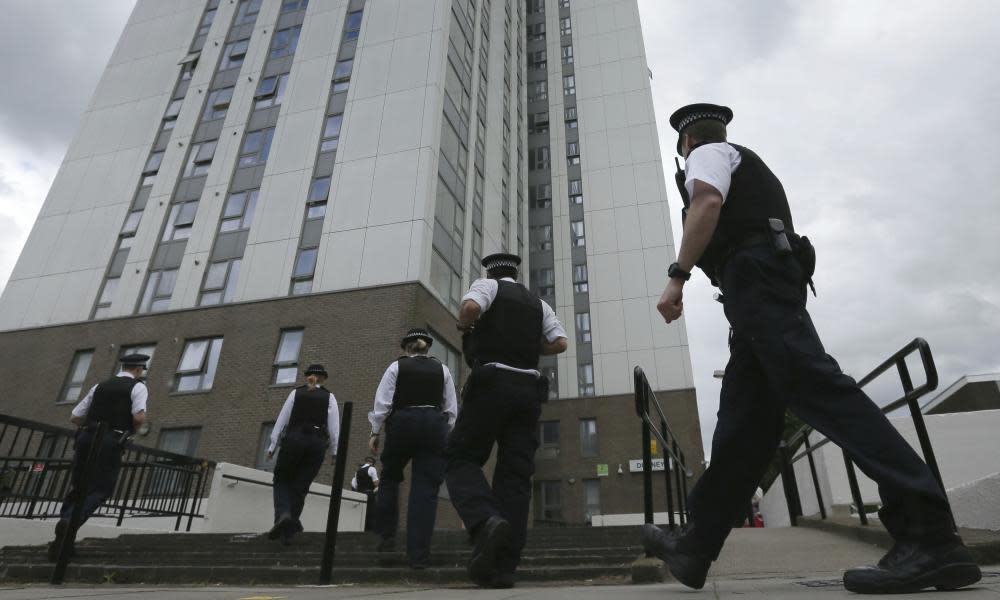I introduced a bill to protect tenants. Grenfell shows why they need it | Karen Buck

Today the friends and families of the victims of the Grenfell Tower disaster remain in mourning and a community remains in shock. As a neighbouring MP – and previously a representative for that part of north Kensington where the devastated tower stands – I am deeply aware of how widely and intensely that shock is felt.
Meanwhile, a local council is still reeling as its failures have been exposed, and thousands of high-rise residents across the country are waiting anxiously for confirmation that the safety of their homes is not in doubt. That a north London council felt it necessary to evacuate residents late on Friday, and at least 60 high-rise buildings across the country have been deemed unsafe, only illustrates the potential scale of what is turning into a national emergency. Our early priorities are clear: to give relief and comfort to those suffering; reassurance and urgent action to deal with concerns affecting high-rises across the country; and of course a swift and rigorous inquiry into what went wrong.
The call from the Grenfell survivors is for accountability, and that is what they must have. The public inquiry will establish the cause of the fire and why it spread so quickly and with so deadly an impact, when most fires in tower blocks do not. Recommendations must be acted upon with an urgency that has not applied to all the lessons of the Lakanal House fire in Southwark in 2009. Yet it is not too early to start looking at wider lessons – whether of safety or of housing policy – and to act on them.
We already know that councils with substantial numbers of high-rise blocks need financial support to complete all necessary safety checks and remedial works. Yet local government has borne the brunt of central government spending cuts. Kensington, dependent on grant for almost three-quarters of its spending in 2009/10, has seen its budget shrink by 38% from £253m to £156m. Westminster’s has been cut by 48%, Manchester’s by 37%, Hackney’s 35%, and Birmingham’s by 34% (Surrey’s, which has fallen by 6%, is another story): the list goes on. So councils need to know that the new costs imposed on them will be underwritten by Whitehall. And then the government needs to look at the impact of spending cuts on, among other things, environmental health inspectors, who are the front line of defence against many hazards in rented housing.
The tragedy of Grenfell Tower exposes the over-stretched state of social housing, especially in London
Up to a third of residents in council tower blocks own their own flats or are privately renting from someone who does, or from a company that is legally subletting. Regulations have not caught up with that reality. As a result, requirements, such as those affecting fire doors, can vary. Enforcement powers do not always exist. Major refurbishments, including those relating to fire safety, can be subject to severe delays. These issues could be tackled by updating the Regulatory Reform (Fire Safety) Order to allow a tower-block freeholder access to individual flats, whatever the tenure, to make safety improvements.
Meanwhile, tenants can lack effective powers to hold landlords to account. The government needs to strengthen accountability in several ways. It could allow victims of breaches of building regulations to sue for damages. It could introduce a statutory consultation process for tenants where major building works are planned (one already exists for leaseholders). It could support a revised version of the homes (fitness for human habitation) bill – which I introduced as a private member’s bill in 2015 (and the opposition then put forward, unsuccessfully, as an amendment to the Housing and Planning Act 2016). This would give tenants the right to take legal action when their accommodation is substandard, rather than having to rely, as they do now, on a cash-starved local authority to do so on their behalf.
The tragedy of Grenfell Tower exposes the over-stretched state of social housing, especially in London. Survivors must have priority for decent, affordable local homes. But that shouldn’t be at the expense of others who are homeless or in desperate housing need, although I fear it will. Homelessness is already rising fast. Since 2010 it has increased by 17% and the number of families in temporary accommodation has risen by a staggering 61% in England and Wales – due to both a shortage of social housing and welfare cuts. Yet the number of homes for social renting “started” has fallen from 39,492 in 2009-10 to just 944 in 2016-17. The situation is grim and getting grimmer.
Nothing can now undo the horrors of Grenfell Tower. The survivors rightly want justice. But it is also time for a fundamental change in our national approach to meeting housing need, to one that recognises social housing as part of the solution, not the problem – and that puts decency, safety and a recognition of the importance of community at its heart.

 Yahoo News
Yahoo News 
